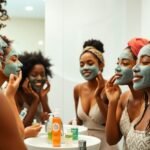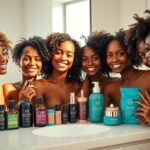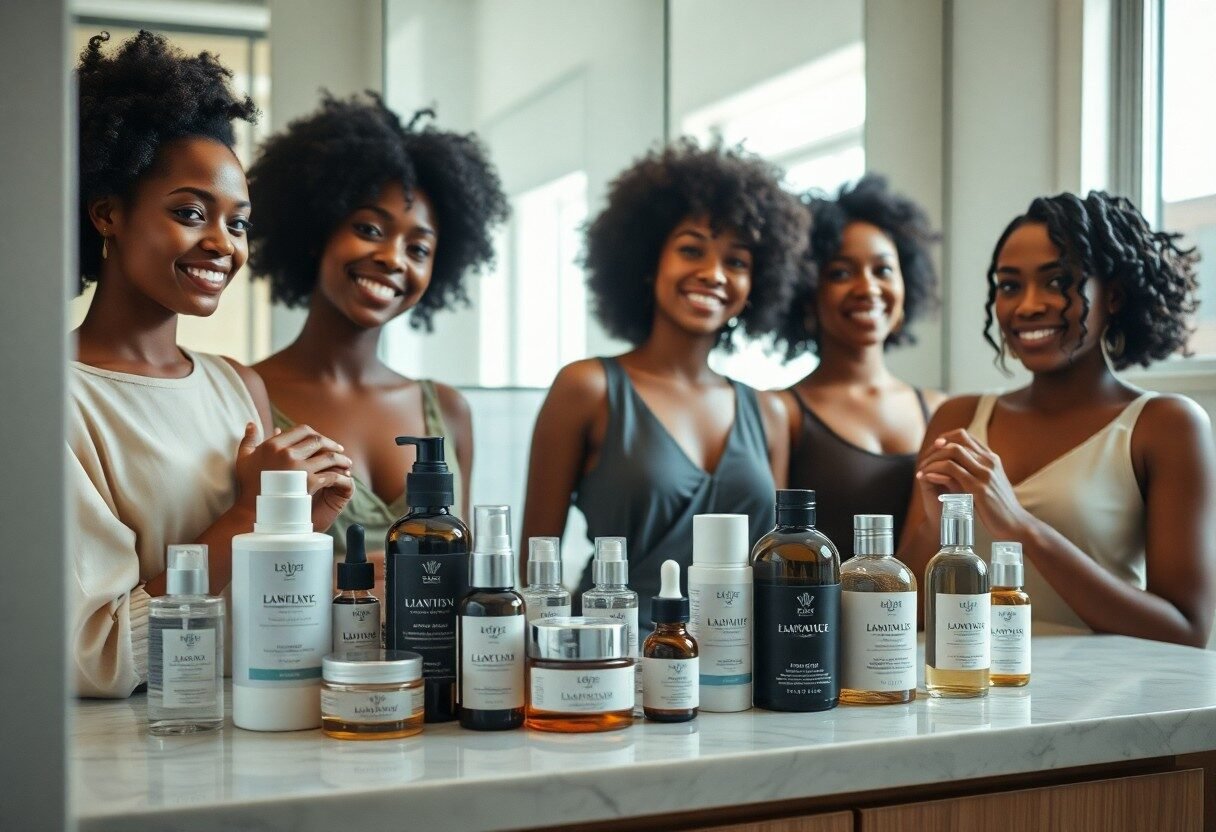
Most women of color face unique skincare challenges that require tailored solutions. I understand that your skin may be more prone to hyperpigmentation, acne, and dryness. With the right products and routine, you can enhance your natural beauty while addressing these specific concerns. In this post, I will share imperative tips and products that cater to your skin type, keeping it healthy and radiant. Let’s investigate the must-have skincare imperatives that can transform your skincare routine.
Key Takeaways:
- Understand your skin type: Women of color often have unique skin types that may require tailored products, so it’s important to identify whether you have oily, dry, or combination skin.
- Prioritize hydration: Incorporate hydrating products, such as moisturizers and serums, to maintain skin elasticity and prevent dryness.
- Use sunscreen daily: Protecting your skin from UV damage is crucial, regardless of skin tone. Look for broad-spectrum SPF 30 or higher.
- Address hyperpigmentation: Products containing ingredients like vitamin C, niacinamide, or alpha arbutin can help even out skin tone.
- Exfoliate appropriately: Regular exfoliation can enhance skin texture. Choose gentle exfoliants suited for your skin type to avoid irritation.
- Be mindful of makeup: Opt for makeup products that cater to your specific skin tone and type to ensure a flawless finish without causing breakouts.
- Consult a dermatologist: Professional advice can offer personalized solutions, especially for addressing concerns like acne scars or skin conditions common in women of color.
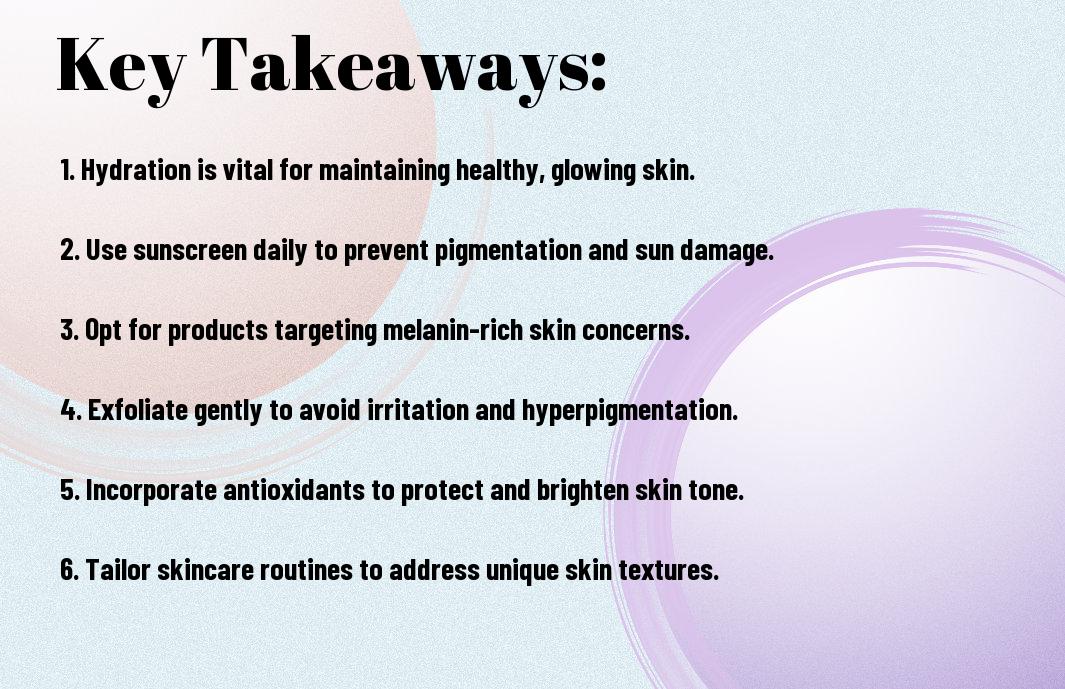
The Unique Challenges of Darker Skin Tones
Hyperpigmentation: Causes and Solutions
Hyperpigmentation is a common concern for women of color, often resulting from conditions like post-inflammatory discoloration after acne or sun exposure. This uneven skin tone occurs when excess melanin production is triggered, leading to darker patches on the skin. To combat this, I recommend incorporating ingredients like Vitamin C, niacinamide, and alpha hydroxy acids into your routine, as these can help to lighten dark spots over time and promote an even skin tone.
Sensitivity and Inflammation in Melanated Skin
Melanated skin can exhibit heightened sensitivity and a propensity for inflammation, which often manifests as itching, redness, or rash. These reactions are frequently exacerbated by harsh products or environmental stressors. Understanding your skin’s needs is critical to preventing discomfort and irritation.
With darker skin tones, the risk of inflammation can increase due to the unique anatomical structure of our skin. For instance, the thicker dermal layer might lead to a longer healing time from minor irritations, resulting in potential hyperpigmentation. I’ve found that using gentle, alcohol-free cleansers and seeking out products formulated specifically for sensitivity can greatly help mitigate these issues. Maintaining a consistent routine, prioritizing hydration, and utilizing soothing ingredients such as aloe vera and green tea extract can support your skin in navigating sensitivity and inflammation effectively.
The Role of Climate and Environment
The climate and environment you live in significantly impact your skin’s health. Variations in humidity, temperature, and pollution levels can result in unique challenges for women of color, often leading to dryness or breakouts.
Living in an area with high humidity can lead to oily skin and exacerbation of conditions like acne, while dry climates may cause increased dryness or flakiness that can affect dark skin tones disproportionately. Additionally, environmental pollutants can provoke oxidative stress, leading to premature aging and darker skin conditions. Incorporating products with antioxidants and SPF protection into your daily routine can greatly minimize the adverse effects of your environment. It’s also beneficial to adapt your skincare regime seasonally, switching to heavier moisturizers in winter and lightweight, breathable options in summer to keep your skin balanced and healthy all year round.
The Science of Melanin: Why It Matters in Skincare
Understanding Melanin Production
Melanin is the pigment responsible for the color of your skin, hair, and eyes. Produced by specialized cells called melanocytes, it serves as a natural defense mechanism against environmental stressors. For women of color, increased melanin production means greater skin tones that range from warm brown to deep ebony. This unique trait plays a significant role in determining how your skin reacts to various skincare products and treatments. It’s about understanding your skin’s needs and utilizing products that cater to those specific characteristics.
The Protective Role of Melanin Against UV Damage
Melanin provides a natural barrier against ultraviolet (UV) radiation, which can cause skin damage and increase the risk of skin cancers. Higher melanin levels in darker skin tones allow for better absorption of UV rays, reducing the likelihood of sunburn. It’s fascinating to note that while having more melanin offers a level of protection, it does not eliminate the need for sun protection altogether.
Melanin absorbs UV radiation and dissipates it as heat, which significantly lowers the risk of DNA damage to skin cells. However, the protective effect is not absolute; studies suggest that darker skin can still suffer from UV-related issues, such as hyperpigmentation and premature aging. Even with higher melanin content, UV exposure can lead to uneven skin tone and texture, so incorporating a broad-spectrum sunscreen daily is crucial, regardless of your skin type or color.
Dispelling Myths Around Sun Protection for Women of Color
A common misconception is that women of color don’t need to worry about sun protection due to the natural shielding of melanin. This misleading belief can lead to inadequate skincare practices and an increased risk of skin damage. You might think that your skin’s pigmentation naturally protects you, but failing to apply sunscreen regularly can leave you susceptible to issues like hyperpigmentation and skin cancer.
The idea that darker skin tones don’t get sunburned can create a dangerous false sense of security. Studies have shown that while the risk might be lower than that for lighter skin, significant UV damage can still occur. I cannot stress enough the importance of using an SPF of at least 30 every day. Making it a part of your routine ensures that your skin remains healthy and radiant, paving the way for effective treatment and maintenance of your unique complexion.
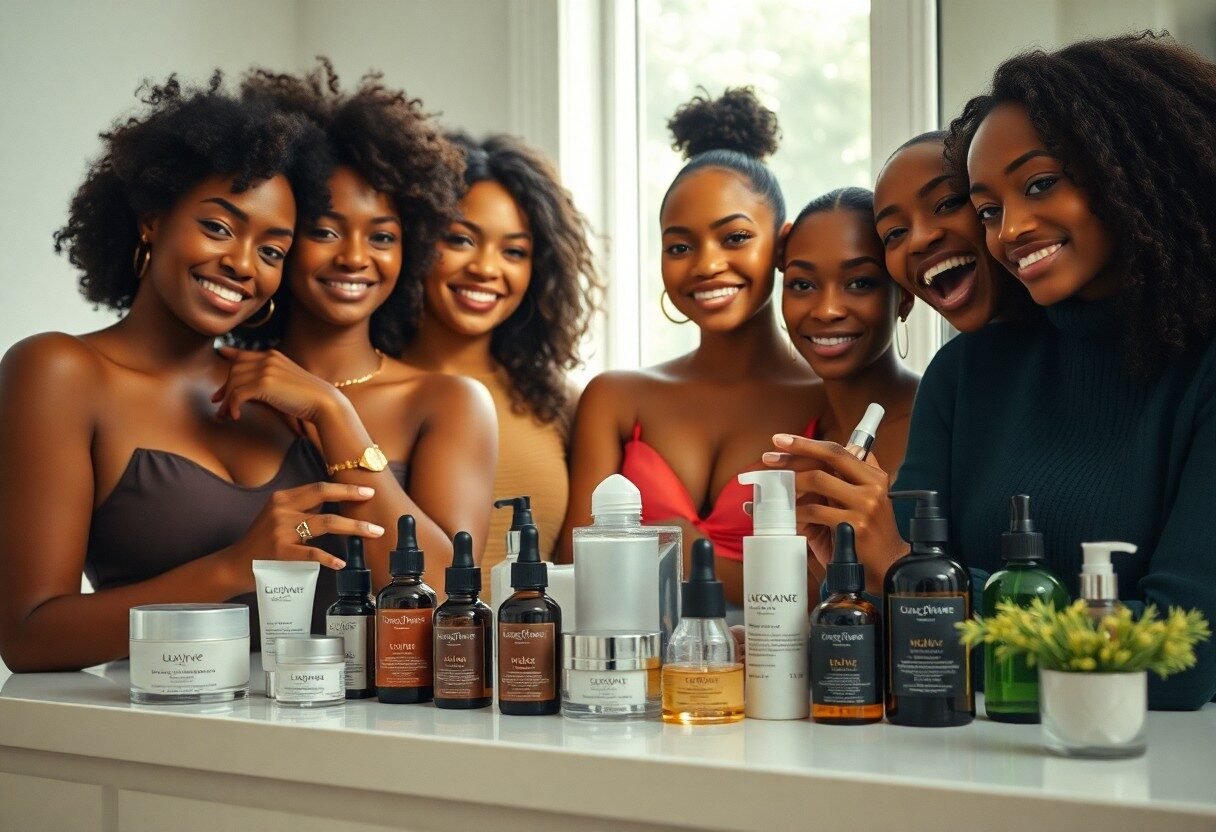
Essential Ingredients for Radiant Skin
Antioxidants: The Power of Vitamins C and E
Incorporating Vitamins C and E into your skincare routine can significantly boost your skin’s health. Vitamin C is a potent antioxidant that helps fight free radicals, brightening your complexion and reducing hyperpigmentation. Vitamin E not only enhances skin hydration but also protects against oxidative stress. Together, they form a powerful duo that promotes a youthful, radiant appearance, making them important for women of color striving for glowing skin.
Exfoliants: Chemical vs. Physical and Their Effectiveness
Exfoliation is key to maintaining smooth, vibrant skin. Chemical exfoliants, such as alpha-hydroxy acids (AHAs) and beta-hydroxy acids (BHAs), dissolve dead skin cells and improve skin texture without the scrubbing associated with physical exfoliants like scrubs. Each method has its advantages, but understanding how they work can help you choose what’s best for your skin’s unique needs.
Chemical exfoliants are generally more effective for deeper renewal because they penetrate into the skin, aiding in the removal of dead cells and promoting cell turnover. AHAs are especially beneficial for dry, sun-damaged skin as they enhance moisture retention, while BHAs are ideal for oily and acne-prone complexions since they can penetrate pores and reduce breakouts. Meanwhile, physical exfoliants can sometimes cause microtears, which may lead to irritation, particularly for those with sensitive skin types. Finding the right balance is important for achieving the radiant skin you desire.
Moisturizers: Importance of Hydrating Agents
Hydration is fundamental in any skincare routine, especially for women of color who may experience dryness due to environmental factors or skin conditions. Using well-formulated moisturizers that contain hydrating agents like hyaluronic acid, glycerin, and ceramides can help lock in moisture, resulting in a plump and supple complexion.
Hyaluronic acid can hold up to 1,000 times its weight in water, making it invaluable for maintaining skin elasticity and hydration levels. Ceramides restore the skin’s natural barrier, helping to prevent moisture loss and protect against irritants. Investing in a good moisturizer tailored to your skin type ensures that you maintain optimal hydration, which is important for achieving and preserving a radiant complexion. When your skin is adequately moisturized, it appears healthier, more luminous, and less prone to issues such as flakiness and dullness.
Tailored Skincare Routines for Diverse Needs
Morning vs. Evening Regimens: What to Prioritize
Creating your skincare routine is all about timing. In the morning, focus on hydration, sun protection, and antioxidants to shield your skin from environmental stressors. Your evening routine should prioritize cleansing, repair, and nourishment, allowing your skin to rejuvenate overnight. Tailor your products based on your skin type and concerns, ensuring each step is functional and effective.
Adapting Products for Seasonal Changes
As the seasons shift, so should your skincare products to cater to your skin’s evolving needs. Cold, dry weather can sap moisture, while heat and humidity may lead to oiliness. Adjust your formulas accordingly; switch to a heavier moisturizer in winter and a lightweight, oil-free gel in summer.
For instance, I often recommend adding a hyaluronic acid serum during dry months to infuse hydration. As temperatures rise, consider a gentle exfoliating toner to manage excess oil and sweat, which helps in maintaining your skin’s clarity and prevents breakouts. Keeping an eye on your local climate can guide these adjustments, ensuring you stay comfortable and radiant throughout the year.
Customizing for Skin Conditions: Acne, Eczema, and More
Each individual’s skin story is unique, particularly if you deal with conditions like acne or eczema. Tailoring your regimen requires specific products that address these concerns while being mindful of your skin’s sensitivity. For acne-prone skin, incorporating salicylic acid and lightweight moisturizers can help control breakouts without causing irritation.
For those with eczema, look for creams that feature ceramides and are free from fragrances and harsh ingredients. I’ve seen success with brands that focus on hypoallergenic formulations to prevent flare-ups. Customization based on how your skin reacts to specific products can dramatically improve both your skin’s health and your confidence.
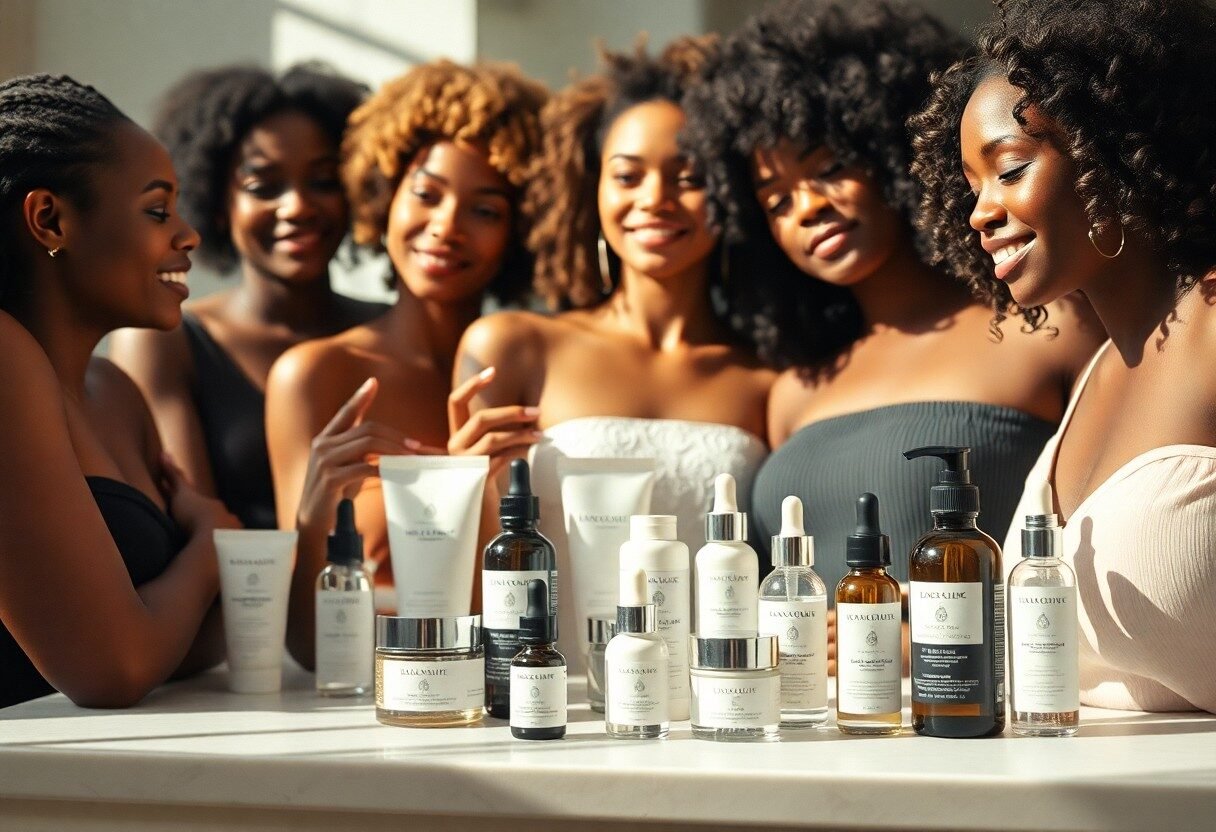
The Intersection of Health and Beauty
Nutrition’s Role in Skin Health: Foods to Integrate
Your skin thrives on nutrients, and incorporating foods rich in antioxidants, vitamins, and healthy fats can make a significant difference. Foods like avocados, berries, and leafy greens provide your skin with important vitamins, while omega-3-rich fish such as salmon contribute to a healthy barrier function. Additionally, hydrating foods like cucumbers and tomatoes play a vital role in maintaining moisture levels. Focusing on a balanced diet not only enhances your skin’s appearance but also supports your overall well-being.
The Impact of Stress on Skin and Solutions
Stress can manifest on your skin in various forms, from acne to eczema flare-ups. The hormones released during stressful periods can trigger inflammation and exacerbate existing skin conditions. Implementing regular self-care practices, such as meditation, yoga, or even just a walk outdoors, can help mitigate these adverse effects. Additionally, consider engaging in skincare routines that incorporate calming ingredients like chamomile or lavender, which can be beneficial for both your skin and mental well-being.
The relationship between stress and skin health is significant, as stress acts like a catalyst for various skin issues. I’ve noticed that during particularly stressful times, my skin tends to react negatively, exhibiting breakouts and dullness. To combat this, I carve out intentional periods for relaxation and adopt mindfulness techniques. Incorporating stress-relief practices can lead to a clearer complexion. Keeping a daily journal, practicing deep breathing exercises, and maintaining a supportive social network help create a positive feedback loop that contributes to radiant skin.
Sleep and Its Unsung Importance in Skincare
Investing in your sleep is a game-changer for skin health, as it plays an important role in cellular repair and regeneration. During deep sleep, your body produces growth hormones that facilitate skin healing and rejuvenation. Lack of sleep can lead to increased cortisol levels, which can trigger inflammation and breakouts. Aiming for 7-9 hours of uninterrupted sleep each night can dramatically benefit your complexion.
Quality sleep allows your body to perform important functions, including repairing skin damage and fighting inflammation. I’ve experienced improvements in my skin’s texture and clarity simply by prioritizing my sleep schedule. Creating a calming bedtime routine, such as dimming the lights, reducing screen time, and practicing relaxation techniques, sets the stage for restorative sleep. Pairing this with a consistent sleep schedule reaps significant rewards for a brighter, healthier complexion, making it a vital aspect of any skincare regimen.
Cultural Perspectives: Celebrating Diversity in Beauty
Traditional Practices from Around the World
Across cultures, traditional skincare practices offer unique insights into enhancing beauty. For instance, in India, the use of turmeric in skincare is renowned for its anti-inflammatory and brightening properties. Meanwhile, Japanese women swear by their double cleansing method, which helps maintain a clear and radiant complexion. From the honey and olive oil used in Mediterranean regions to the shea butter beloved in West Africa, these practices not only nourish the skin but also connect us to our heritage.
The Influence of Cultural Heritage on Skincare Approaches
Your skincare routine often reflects your cultural background, blending generations of wisdom with modern products. For instance, African, Asian, and Latin American communities often prioritize natural ingredients that have been passed down through family traditions. This cultural lens informs the use of practices like facial massage, herbal remedies, and even specific rituals at different life stages, all serving to connect beauty with personal identity.
Incorporating elements of one’s cultural heritage into a skincare routine can elevate the experience beyond just vanity. I’ve found that many women of color embrace ingredients rooted in their ancestry, whether it’s using rice water for brightening the skin or incorporating healing clays for detoxification. These practices help forge a connection between self-care and personal history, creating a sense of ownership and individuality in beauty routines. By understanding the origins of these practices, you also cultivate a deeper appreciation for the diverse methods employed worldwide.
Empowering Women of Color Through Skincare Education
Access to skincare education is vital for empowering women of color to make informed choices about their beauty regimen. During workshops or online platforms, discussions around the specific needs of melanin-rich skin can help unravel misconceptions and promote effective practices. Knowledge is key, and understanding ingredients and formulations will allow you to navigate the skincare aisle with confidence.
When I engage in skincare education with women of color, the focus shifts toward self-advocacy. For example, I’ve seen firsthand how education can demystify ingredients that are often labeled ‘exotic’ or ‘niche’—encouraging women to trust their skin’s unique needs and voice. Workshops that incorporate personal stories create a shared community where women feel empowered to ask questions, experiment, and confidently embrace their beauty. Such empowerment leads to a ripple effect, inspiring others to prioritize healthy skin and craft routines that celebrate diversity.
Navigating the Skincare Product Landscape
Reading Labels: What to Look For and What to Avoid
Understanding skincare product labels empowers you to make informed choices. Look for ingredients like hyaluronic acid and niacinamide, celebrated for their hydrating and brightening effects. Steer clear of products that contain alcohol or fragrance, as these can lead to irritation, especially in darker skin tones that are more prone to hyperpigmentation. Always pick formulations specifically labeled for your skin type, whether oily, dry, or sensitive.
The Rise of Inclusive Brands: Key Players in the Market
Inclusive brands have transformed the skincare industry, often tailoring products to meet the diverse needs of women of color. Companies like Fenty Skin and The Ordinary prioritize high-quality ingredients while providing a variety of shades that accommodate melanin-rich skin types. This shift reflects a greater acknowledgment of the unique skincare concerns faced by women of color.
In recent years, the landscape has been enriched by brands dedicated to inclusivity, such as Unsun and Black Girl Sunscreen. These companies not only focus on efficacious formulations but also embrace the cultural narratives that women of color bring to beauty. By understanding which brands cater to your unique skin type concerns, you can achieve optimal results and feel empowered in your skincare journey.
DIY Remedies: Benefits and Risks
DIY skincare remedies can be enticing, allowing for customization using natural ingredients you may already have at home. Ingredients like honey for its antibacterial properties, or avocado for hydration, can yield fantastic results. However, the risks lie in the potential for allergic reactions or imbalances, particularly if you stray from proven recipes. Always patch-test before applying any new concoction.
Engaging in DIY skincare offers a creative outlet, enabling you to tailor treatments exactly to your skin’s needs. However, caution is warranted. Some natural ingredients may cause unexpected side effects, especially if you’re already using other products with active ingredients. It’s vital to research thoroughly and possibly consult a skincare professional before entering into DIY solutions, ensuring that your attempts enhance rather than harm your skin health.
Building Confidence Through Skincare
The Psychological Benefits of a Personalized Routine
Establishing a personalized skincare routine can significantly enhance your sense of self-worth and confidence. I’ve noticed that when I invest time in products specifically tailored to my skin type and concerns, it can uplift my mood and instill a sense of pride. Seeing tangible results—like clearer skin or a glow—reaffirms my efforts and fosters a positive self-image, while also reducing stress related to skin issues.
Community Engagement: Sharing Experiences and Insights
Connecting with others who share similar skincare challenges and triumphs can be a source of empowerment. Engaging in community discussions, whether through social media platforms or local meetups, fosters a sense of belonging. I often find that these conversations not only provide valuable tips but also validate my experiences and enhance my confidence in my skincare journey.
When I share my skincare journey with others, it opens the door for candid discussions that can be enlightening. I’ve learned about different products, techniques, and cultural practices that resonate with the experiences of women of color. By sharing our stories, we create a platform where we can support and uplift one another, strengthening our collective journey toward better skincare and self-love.
Advocating for Representation in the Beauty Industry
The representation of women of color in the beauty industry remains a vital conversation that impacts our skincare choices and confidence. It’s disheartening to see that many brands still overlook our unique needs, yet we possess the power to demand change. When I see products that cater to my skin tone and concerns, it validates my beauty and encourages me to embrace my unique features.
By advocating for greater representation, we not only challenge brands to expand their offerings but also encourage more inclusive marketing practices. I believe that when major companies highlight diverse beauty, they celebrate individuality and empower us all to embrace our heritage. This collective push for recognition not only transforms the industry but also builds confidence among women of color, creating a ripple effect throughout society. When our voices become part of the narrative, we pave the way for future generations to feel valued and proud of their unique beauty.
Summing up
Conclusively, understanding your unique skincare needs as a woman of color is vital for achieving healthy and radiant skin. I encourage you to explore products that cater specifically to your skin type, focusing on hydration, sun protection, and addressing any pigmentation concerns. By tailoring your skincare routine to your individual requirements, you can enhance your natural beauty and boost your confidence. Invest time in finding what works for you, and don’t hesitate to seek professional advice when needed. Your skin deserves the best care possible.
FAQ
Q: What are the key components of a skincare routine for women of color?
A: A comprehensive skincare routine typically includes cleansing, toning, moisturizing, and protecting the skin with sunscreen. Cleansers should be gentle but effective, toners can help balance the skin’s pH, moisturizers should cater to the skin’s specific needs (like hydration or oil control), and sunscreen is crucial to protect against UV damage.
Q: How can women of color address hyperpigmentation in their skincare routine?
A: Hyperpigmentation is a common concern, and incorporating products with ingredients like vitamin C, niacinamide, or alpha arbutin can be beneficial. Regular exfoliation, either chemically (with AHAs or BHAs) or physically, can help fade dark spots. It’s also important to use broad-spectrum sunscreen daily to prevent further pigmentation issues.
Q: What are the best types of moisturizers for women of color?
A: The best moisturizers depend on individual skin types. For oily or combination skin, lightweight, gel-based moisturizers with hyaluronic acid or glycerin are great options. For dry skin, cream-based moisturizers with shea butter or ceramides can provide the needed hydration and help maintain skin barrier function.
Q: Is sunscreen important for darker skin tones?
A: Yes, sunscreen is important for all skin tones. While darker skin has more melanin and may have some natural UV protection, it is still susceptible to sun damage, premature aging, and skin cancer. A broad-spectrum sunscreen with an SPF of at least 30 should be applied daily.
Q: What specific ingredients should women of color look for in their skincare products?
A: Women of color should look for ingredients that target common concerns such as hyperpigmentation and dryness. Ingredients like vitamin C, licorice extract, and hyaluronic acid can improve skin tone and hydration. Antioxidants, such as green tea extract, can also help protect the skin from environmental damage.
Q: How can women of color determine their skin type?
A: To determine skin type, assess how the skin feels throughout the day. If it appears shiny, oily, or feels thick, it might be oily. If it feels tight and flaky, it may be dry. A combination skin type usually exhibits both oiliness in the T-zone and dryness in other areas. Additionally, skin type can change seasonally or due to other factors, so regular evaluations are recommended.
Q: What are some effective treatments for acne-prone skin for women of color?
A: Treatments for acne-prone skin can include salicylic acid, benzoyl peroxide, and retinoids, which can help prevent and treat breakouts. Incorporating a gentle exfoliant and non-comedogenic moisturizers can also help manage acne without clogging pores. It’s advisable to consult a dermatologist for personalized treatment options, especially for persistent acne.

